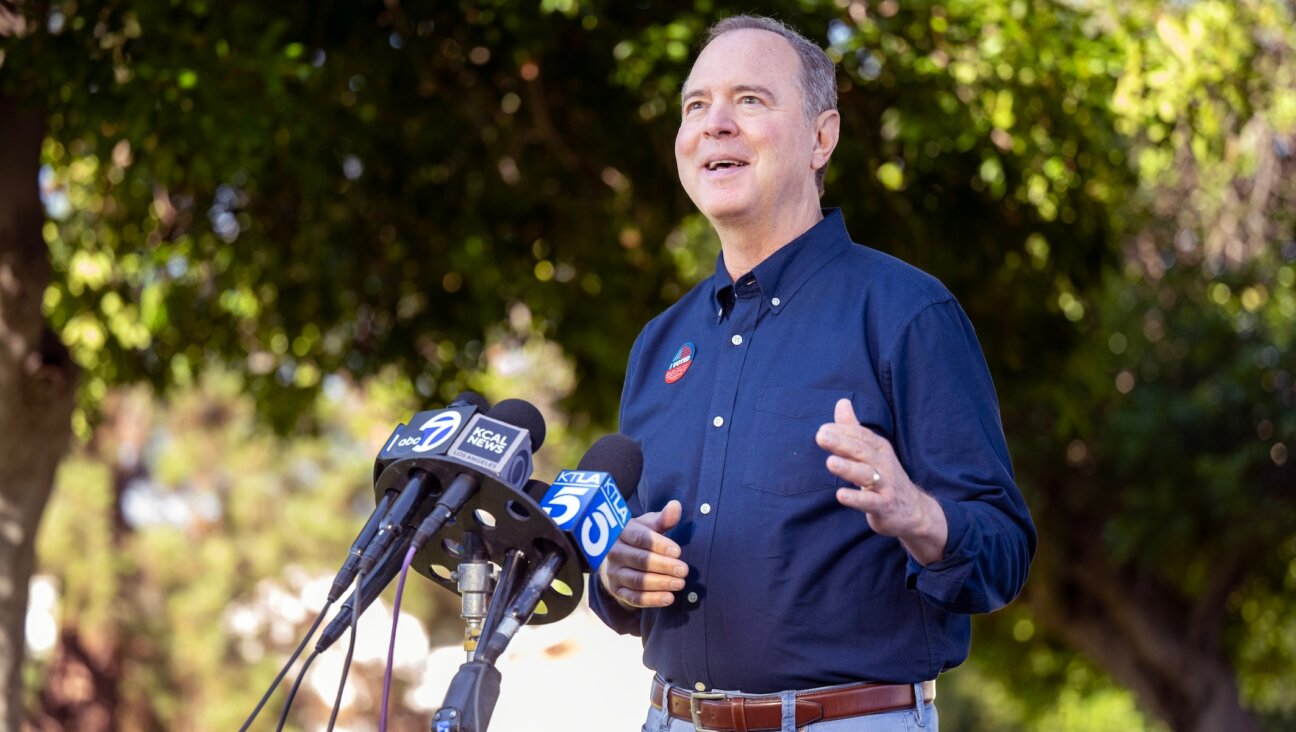Does Michigan Stunner Mean Bernie Sanders Has Real Shot at Democratic Nod?

Image by Getty Images
(JTA) — Can Bernie Sanders actually win it?
With his surprising victory in the Michigan primary by 2 percentage points on Tuesday — after trailing Hillary Clinton by double digits in the polls — the possibility has inched a little closer to reality.
To be sure, Sanders still trails Clinton by a healthy margin in the vital delegates count. But the upset in Michigan boosts his bid to make history as the first Jewish major party nominee and shows him competitive in an arena Clinton thought she owned — big states with substantial minority populations.
No polling in the last month had showed Clinton with anything less than a 5 percent margin of victory. Some showed her with a 20-point lead, according to the FiveThirtyEight blog, which said Sanders pulled off the biggest upset in at least 30 years and possibly called into question polls predicting overwhelming losses in upcoming contests.
In an especially good sign for Sanders, the Vermont senator did unexpectedly well among African-American voters, winning 30 percent support in Michigan, according to exit polls — still a loss, but significantly better than his performance in earlier states with large numbers of black voters.
Sanders relished his comeback kid status on Tuesday night, thanking the people of Michigan, “who repudiated the polls … who repudiated the pundits who said Bernie Sanders was not going anywhere.”
Speaking from Florida, which goes to the polls on March 15, he said, “The political revolution that we were talking about is strong in every part of the country and frankly we believe that our strongest areas are yet to happen.”
The wind behind Sanders’ unexpected success until now has been the caucus. The hours-long events involving spirited debate among folks steeped in politics has favored the Democratic underdog, who has won five of those contests outright and lost by narrow margins in the other two.
Primaries, which entail the simple casting of a vote, have been a tougher slog for Sanders. He had previously won only three of the 13 held, including in his home state.
But with only two caucus states remaining, Sanders had to show he could win in a big state primary. Other than Vermont and New Hampshire, both small and overwhelmingly white, his only other primary victory has been in Oklahoma.
Michigan showed that victory wasn’t a fluke. He worked the state hard, holding a town meeting in Flint, where a water contamination crisis threatens to unseat the state’s Republican governor. And he attempted to burnish his credentials among minorities, emphasizing the support he has garnered from black celebrities such as film director Spike Lee and rapper Killer Mike, and focusing on inequities in the criminal justice system, which disproportionately jails blacks, Latinos and Native Americans.
Sanders prevailed in Michigan despite stumbling somewhat in the debate in Flint on Sunday night. Asked about what racial blind spots he has, Sanders said: “When you’re white, you don’t know what it’s like to be living in a ghetto, you don’t know what it’s like to be poor.” The ghetto comment sparked an online backlash, with many noting that not all black people live in ghettos, while the poverty comment was seen as ignoring widespread economic pain among the white working class.
He also drew criticism for admonishing Clinton as she tried to defend herself against his efforts to tie her to Wall Street. Clinton interrupted Sanders, who responded,” Excuse me, I’m talking.” Some found the exchange condescending and reminiscent of Barack Obama’s “You’re likable enough, Hillary” from 2008, which dealt Obama a temporary setback. The audience booed Sanders.
Even after Michigan, Sanders still trails Clinton by a wide margin in the delegate count, 1,221-571, according to The Associated Press. Clinton won nearly all the delegates in Mississippi with an overwhelming victory on Tuesday.
But the Sanders campaign points out that nearly one-third of Clinton’s delegates, 461, are so-called superdelegates that are not up for grabs in state contests. Sanders has argued that if he manages to close the gap on pledged delegates — he trails there by 205 — then party officials who can choose which candidate to support would come under pressure to back him.
Sanders still has time to catch Clinton. Two states with huge numbers of delegates at stake – California and New York – are still to come. And the Democratic hopefuls are running neck and neck in Missouri, which has a primary on March 15.
Clinton still acts like a front-runner. In her victory speeches, the former secretary of state has focused more on what her campaign now sees as a likely inevitable match with Republican front-runner Donald Trump, contrasting her inclusive message with Trump’s penchant for insulting his rivals and aiming harsh language at Hispanics and Muslims.
On Tuesday evening, she played on Trump’s “Make America great again” slogan, declaring, “We can’t be talking about building walls or turning the clock back, we have to talk about what made America great in the first place.”
In the Flint debate on Sunday, Sanders was asked again to respond to concerns that he has downplayed his religious heritage, and he responded again by asserting his pride in being Jewish and the lessons that he draws from it.
“I am very proud to be Jewish, and being Jewish is so much of what I am,” Sanders said.
“Look, my father’s family was wiped out by Hitler in the Holocaust,” he said. “I know about what crazy and radical, and extremist politics mean. I learned that lesson as a tiny, tiny child when my mother would take me shopping, and we would see people working in stores who had numbers on their arms because they were in Hitler’s concentration camp.”
He said in closing: “I am very proud of being Jewish, and that is an essential part of who I am as a human being.”
A message from our CEO & publisher Rachel Fishman Feddersen

I hope you appreciated this article. Before you go, I’d like to ask you to please support the Forward’s award-winning, nonprofit journalism during this critical time.
At a time when other newsrooms are closing or cutting back, the Forward has removed its paywall and invested additional resources to report on the ground from Israel and around the U.S. on the impact of the war, rising antisemitism and polarized discourse..
Readers like you make it all possible. Support our work by becoming a Forward Member and connect with our journalism and your community.
— Rachel Fishman Feddersen, Publisher and CEO























